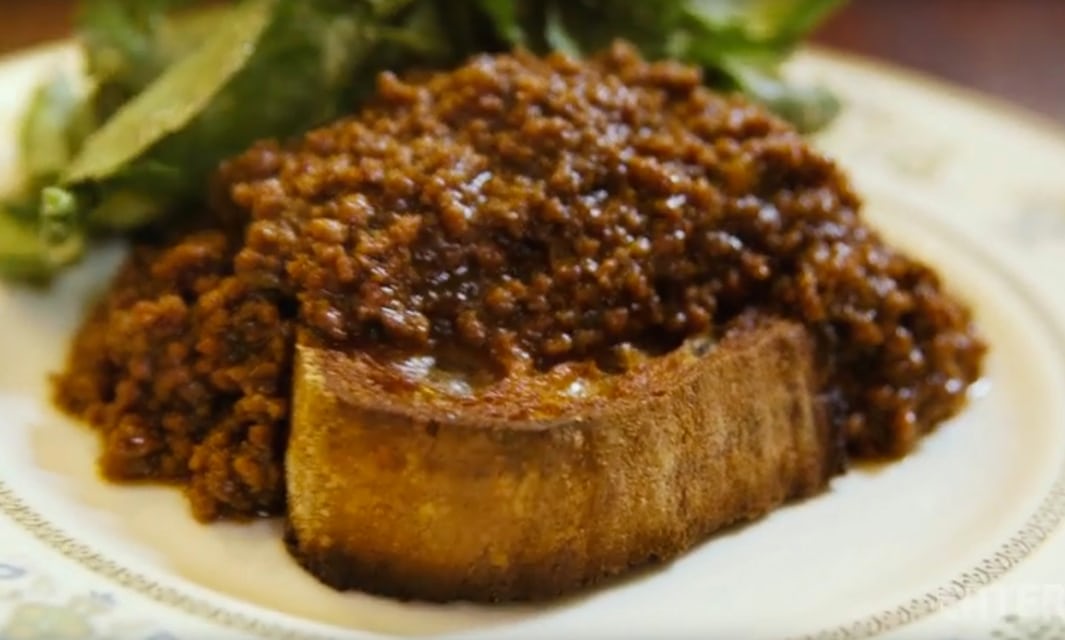
I have eaten mince on toast. Often. More specifically, I have eaten the mince on toast that caused the entire nation, or the entire nation that likes pretending to be annoyed about things on Twitter and Facebook, to revel in a collective “WTF?” this week.
It’s the mince on toast dish cooked by Shaun Searley at the Quality Chop House in east London – a critics’ darling of a restaurant since its relaunch a few years ago. It’s always been called the Quality Chop House apart from when it was run by the owners immediately previous to the current one, when it was a not-terribly good meatball place for a few months. It has always looked the same: the quintessential British classic restaurant, though “comfort” may be stretching it, given the narrow booth benches. You know it even if you don’t. About 80% of period dramas based in the early to mid 20th century have included scenes shot there.
Given the general love given to the Quality Chop House by people who are paid to eat food (and people who aspire to be paid to eat food) in London, I was surprised that the Observer’s Jay Rayner, not a man normally to shirk the meatier, and earthier, ends of the menu, tweet that he had never eaten mince on toast, what has been before, and certainly is now, Quality Chop House’s signature dish, as much of a classic for diners there as roast bone marrow is to diners at St John, down the road.
As I said, I’ve eaten it a lot. When Little Atoms was based first at the old Guardian building, just across the street, I frequented Quality Chop House more than was healthy for my wallet or my waistline. I would eat the mince on toast. What’s more, I would enjoy forcing it on friends.
“You MUST try the mince,” I would command, always hoping for a bit of bite back, a little recoil.
It rarely elicited such a response. Friends generally ate the damned thing without question and enjoyed it.
And it is an immensely enjoyable dish: deep, thick, with a tinge of sweetness, the heaviness of the dripping-fried toast offset by a mound of strong peppery watercress.
But, you say, that’s not what our issue was when we guffawed together on social media, temporarily allowing our bemusement over meat on bread to distract us from the general horror raining upon us every moment of every day. Our objection, you say, was to the fact that Eater, the US site (which launched in London this week) had described mince on toast as a “quintessentially British comfort classic”.
“I’ve never eaten such a thing in my life” a million and one people tweeted.
But I’m not sure that’s the point.
Is mince on toast “quintessentially British”? Yes. I think so. I think it might certainly be the most English thing I have ever eaten. While I’m certain I could never cook mince on toast anywhere as well as Searley does, it has a certain cook-not-chef quality to it that epitomises the British food renaissance that idolises Fergus Henderson, founder at the aforementioned St John. There is no extravagant saucing, no unusual treatments. It’s mince. On toast. Bit of salad. There you go.
The “comfort” claim? Well, I’m queasy about the idea of “comfort food” as a whole, and its dreaded echo “nursery food”, phrases that always smack of a nostalgia for the sound of sobbing in a public school dormitory. But is it a warm, pleasing, satisfying, non-confrontational meal? Yes. It’s never going to turn up as a challenge on Man v Food. It’s quite nice and you could eat it forever without your head coming off.
Is it a “classic”? In enough senses of the phrase, beyond “old” or “established” it is. It is an exemplar of a food culture. It is recognised by critics as worthy of regard (though perhaps not as Quality Chop House’s confit potatoes, which, one suspects, restaurant critic Marina O’Loughlin will have placed in her coffin to sustain her in the underworld, the potatoes having been responsible for her passage there in the first place). And crucially, after this week, mince on toast is very, very well known.